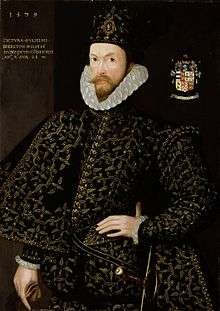William Brereton, 1st Baron Brereton

William Brereton, 1st Baron Brereton (1550 – 1 October 1631) was an English politician who sat in the House of Commons at various times between 1597 and 1622. He was created a peer in the Peerage of Ireland in 1624 as Baron Brereton.

Biography
Brereton was the son of Sir William Brereton of Brereton, Cheshire and was baptised on 6 February 1550. He was about nine when his father died in 1559 and he succeeded to the extensive family estates. He was educated at Oxford University and was awarded BA in 1568. He was admitted at Lincoln's Inn in 1569. From 1573 he was JP for Cheshire and was High Sheriff of Cheshire from 1581 to 1582. In 1586 he built a mansion at Brereton which was similar to Rocksavage, the house of his father-in-law Sir John Savage. He was knighted in 1588. He was commissioner for musters in 1595 and in 1596.[1]
In 1597, Brereton was elected Member of Parliament for Cheshire. He was elected MP for Cheshire again in 1614 and in 1621.[1] He had an estate near Old Leighlin, for which he and his heirs were absentee landlords. He was created Baron Brereton of Leighlin in the County of Carlow on 11 May 1624.[2] Brereton died at the age of about 80 and was buried at Brereton.[1]
Family
Brereton married Margaret Savage, daughter of Sir John Savage of Rocksavage, Cheshire, and Lady Elizabeth Manners (d. 1570), daughter of Thomas Manners, 1st Earl of Rutland. They had four sons and four daughters.[1] Most of them died young two who survived to marry were:
- Mary, on 18 July 1608 married Henry, Lord Inchiquin (died 1645), son of Dermod O'Brien, 5th Baron Inchiquin
- John (Sir), of Brereton (born 25 March 1591), heir apparent, married Anne, daughter of Sir Edward Fitton of Gawsworth, and dying in the lifetime of his father, left by her (who married secondly, Sir Gilbert Gerard), three sons and two daughters:[2]
- William (1611–1664), successor to his grandfather as 2nd baron.
- John (1624 – 22 October 1656)
- Edward.
- Mary, married Sir Michael Hutchinson
- Jane (died 1648) — the eventual heiress of the family — married, around 1646, Sir Robert Holte. Their son was Sir Charles Holte.
References
- 1 2 3 4 History of Parliament Online – WilliamBrereton
- 1 2 Burke, Sir Bernard (1866). A genealogical history of the dormant, abeyant, forfeited, and extinct peerages of the British empire (New ed.). London: Harrison. pp. 74–75.
| Parliament of England | ||
|---|---|---|
| Preceded by Thomas Holcroft John Done |
Member of Parliament for Cheshire 1597–1601 With: Thomas Egerton |
Succeeded by Sir Peter Legh Thomas Holcroft |
| Preceded by Sir Roger Aston Sir Thomas Holcroft |
Member of Parliament for Cheshire 1614–1622 With: Sir Roger Wilbraham 1614–1621 Sir Richard Grosvenor 1621–1624 |
Succeeded by William Booth William Brereton |
| Peerage of Ireland | ||
| New creation | Baron Brereton 1624–1631 |
Succeeded by William Brereton |